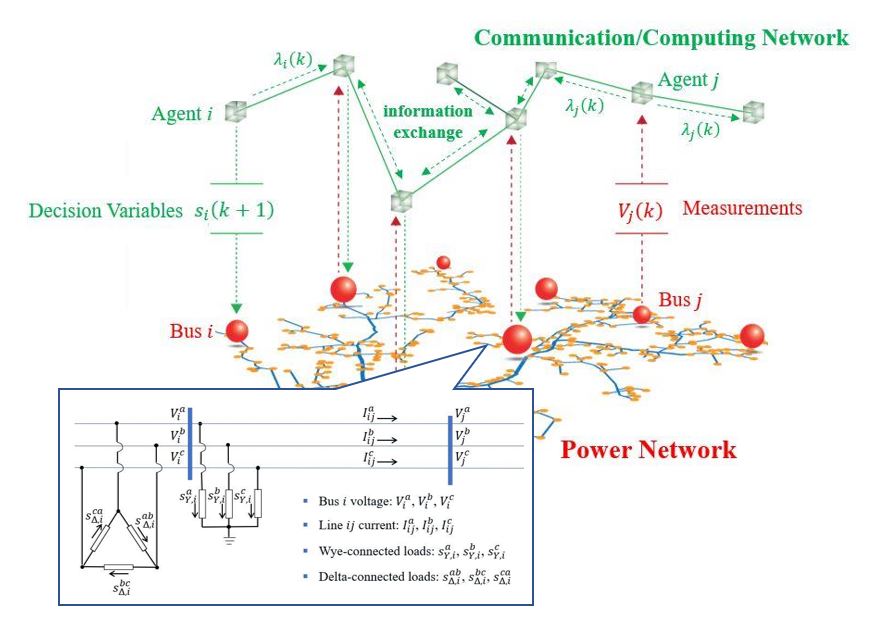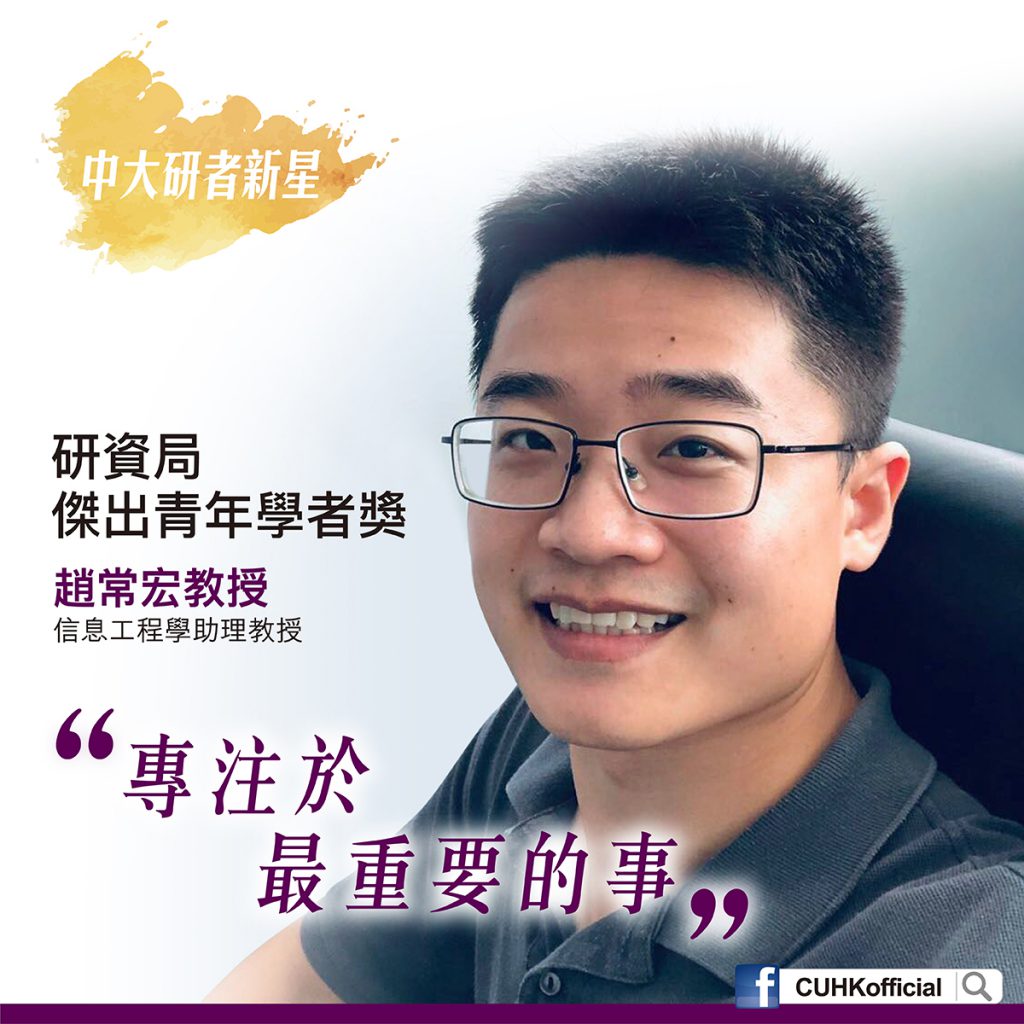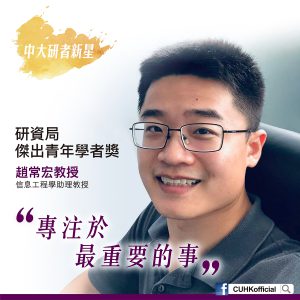Professor Zhao Changhong joining CUHK at an exceptional time
Professor Zhao Changhong joining CUHK at an exceptional time
The past two years have been quite unusual for people in Hong Kong and all around the world. Having joined CUHK for two years, Professor Zhao Changhong has been awarded the “Early Career Award” from the Research Grants Council (RGC) for the project that he is working on. Today, he is going to introduce his project to us, as well as the people and matters which have touched him.
Research project well recognized within only two years
If you are not a “science person”, you might feel quite lost looking at the title of Professor Zhao’s award winning project “Optimizing multiphase power flow via exact convex relaxation and distributed feedback design”.
With lots of questions in mind, see if Professor Zhao’s personal profile can help.
After this young Assistant Professor of CUHK Department of Information Engineering received his Doctoral Degree in Electrical Engineering in California Institute of Technology in 2016, he started to work in the US National Renewable Energy Laboratory, where he led multiple research projects on the smart grid.
During that period, he was occasionally curious about what it would be like to conduct research in a university. He also wanted to change to a different working environment while he is still young. That was the moment when CUHK came back to mind. “I feel very close to CUHK”, he says. When he was pursuing his doctoral degree, he worked with scholars from the Department of Information Engineering from CUHK. He considered that CUHK possesses international perspectives, and great research achievements. Therefore, with resolution, he quit his job in the U.S and joined the CUHK research team in 2019.
“I believe, my research career is still at the stage of growing, learning and discovering,” he said.
His life motto is “focus on what matters”. “A person’s ability, time and efforts are limited, especially when they are still at an initial stage of their career life. I don’t have enough time to perfect everything that I could think of, so the priority is to find ONE most important matter.”

Professor Zhao joined CUHK in 2019. He has been awarded the “Early Career Award 2020” from RGC.
Utilise mathematics for optimisation of renewable power system
Professor Zhao’s expertise is in the control and optimisation of the power grid. These two topics are closely related to applied mathematics, which is a branch of mathematics.
Then, what is he exactly calculating? We can try to understand this by referring to a movie. In Hidden Figures, the heroine is a mathematician who aims to provide accurate calculation of the steering track of a manned spacecraft, in order to allow safe landing of the spacecraft and completion of the mission.
Professor Zhao’s mission is to find out “optimal power flow” algorithms, so a renewable power system can run stably and economically.
Wait… What is “optimal power flow” exactly?
Professor Zhao explained this “unfamiliar” term as follows:
- Power flow—–A technical term from power systems. A power system consists of wires and nodes (which refer to the junction points of wires). We call the distribution of voltage and electric power on nodes and wires respectively as power flow.
- Optimal power flow—–We need to calculate how much voltage and electric power should be at one specific moment in order to reduce power generation costs and power transmission losses.
Cope with massive and rapid changes of new energy via relaxation
Until now, our current power supply has been generally stable and can overcome most erratic weather conditions. However, this research is indispensable if we look into the future when renewable energy becomes our main energy source.
“There is a problem in renewable generation. The rapid, drastic and unpredictable changes in renewable energy, like wind and solar energy, could bring many unstable factors to our power system operations, causing fluctuating voltage or frequency. This may damage our equipment and affect the quality of our electricity.” Professor Zhao patiently explained.
“For instance, a big change occurs every single minute in solar energy generation, which means the computer needs to calculate the ‘power flow optimisation’ every single minute. So that’s why we need to conduct a research like this to improve computational efficiency.”
The more rapid and drastic the change is, the more calmly we need to react. Therefore, he tried to use “relaxation method” to solve the problem.
The more limitations the power system has, the more complicated the problem is. This research strives to think out of the box and propose an algorithm that loosens the problem. The algorithm first removes some limitations and makes the math problems easier to solve, which can shorten the computational time. In the end, among all the possible answers, the computer would have to find out the “best answer” which can satisfy the limitations at that moment and comply with the laws of physics. This is the most difficult part.
If the research works, the algorithms Professor Zhao proposes can promptly cope with the changes in renewable power systems. The algorithms can be adopted in a real electric power network, and even in communication and road traffic networks that are also having many limitations and changes.

Based on the current research about optimal power flow, Professor Zhao’s project strives to make breakthroughs in designing a convex relaxation theory and distributed feedback algorithm for a three-phase unbalanced power network model as shown in the picture.
“CUHK colleagues are doing incredible things”
Doing research is arduous, especially under a new global order. Professor Zhao realises this. “Though our teaching and research are affected to some extent, my colleagues insist on doing their researches and earnestly preparing for online teaching. This has touched me a lot. No matter which stage a city or a society is going through, there should always be people doing research and education, science, literature and arts to make this society a better place. From this point of view, my colleagues at CUHK are doing incredible things. As a new member of the team, I feel very proud and honored and at the same time knowing this comes with great responsibility.”
One may think that researchers spend all day in labs, leading a boring life. However, as a newcomer in the education sector, Professor Zhao has a completely different view, “For me, each day is different. I believe this is the charisma of education. It keeps us refreshed.”
“A formula preserved for posterity is the dream of my career life”
On top of this awarded project which will last for three years, Professor Zhao has a more ambitious goal.
“A research achievement, whether it is a theorem, a formula, or an algorithm, which could be broadly referenced by future scholars, adopted by engineers, or even be written into textbooks, influencing future generations, is the dream of my career life.” He smiled modestly when he finished his words.
No matter how massively the external environment changes, dreams and ambitions are always the power that pushes people to move forward. We look forward to seeing this young professor reaching the boundaries of his domain someday and pushing infinitely beyond them.





